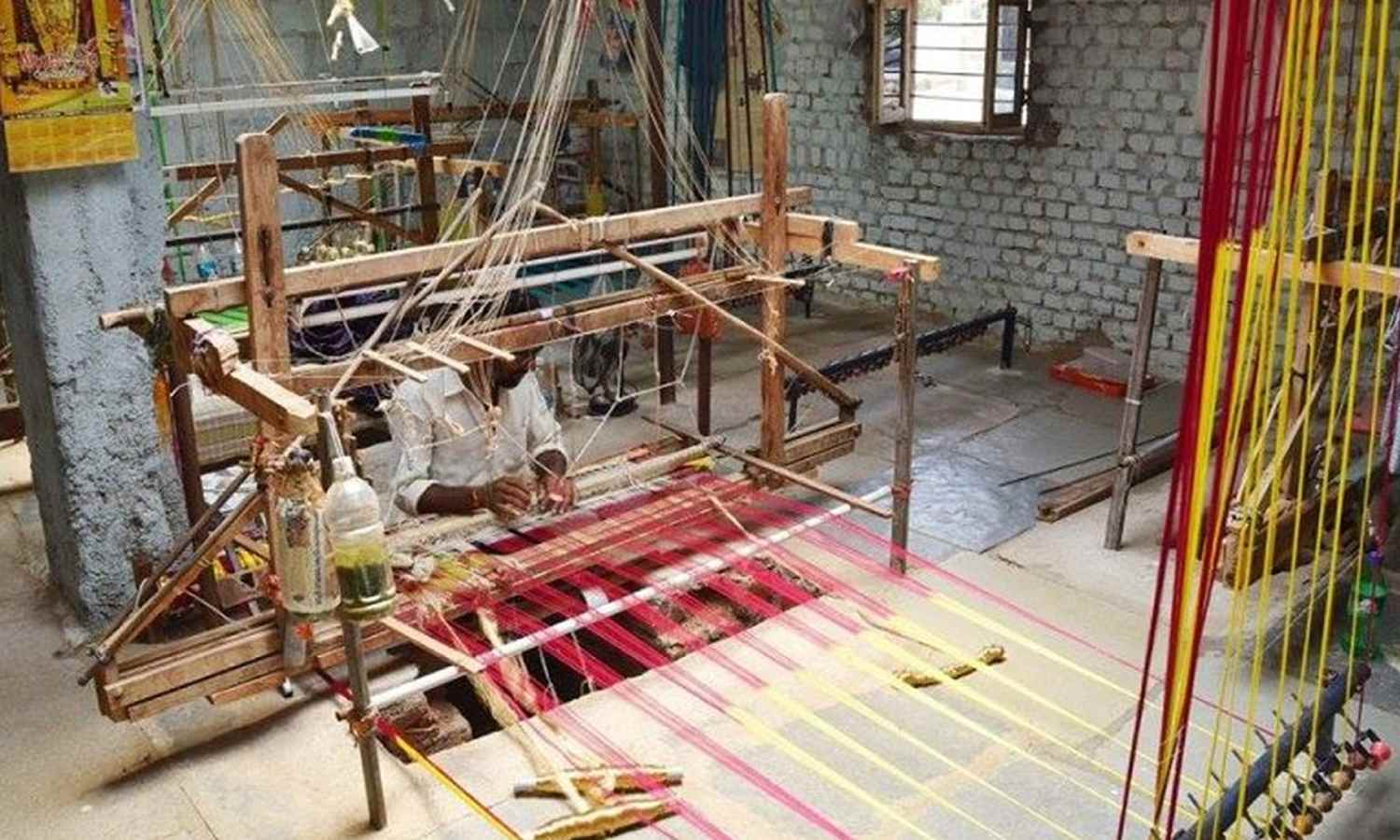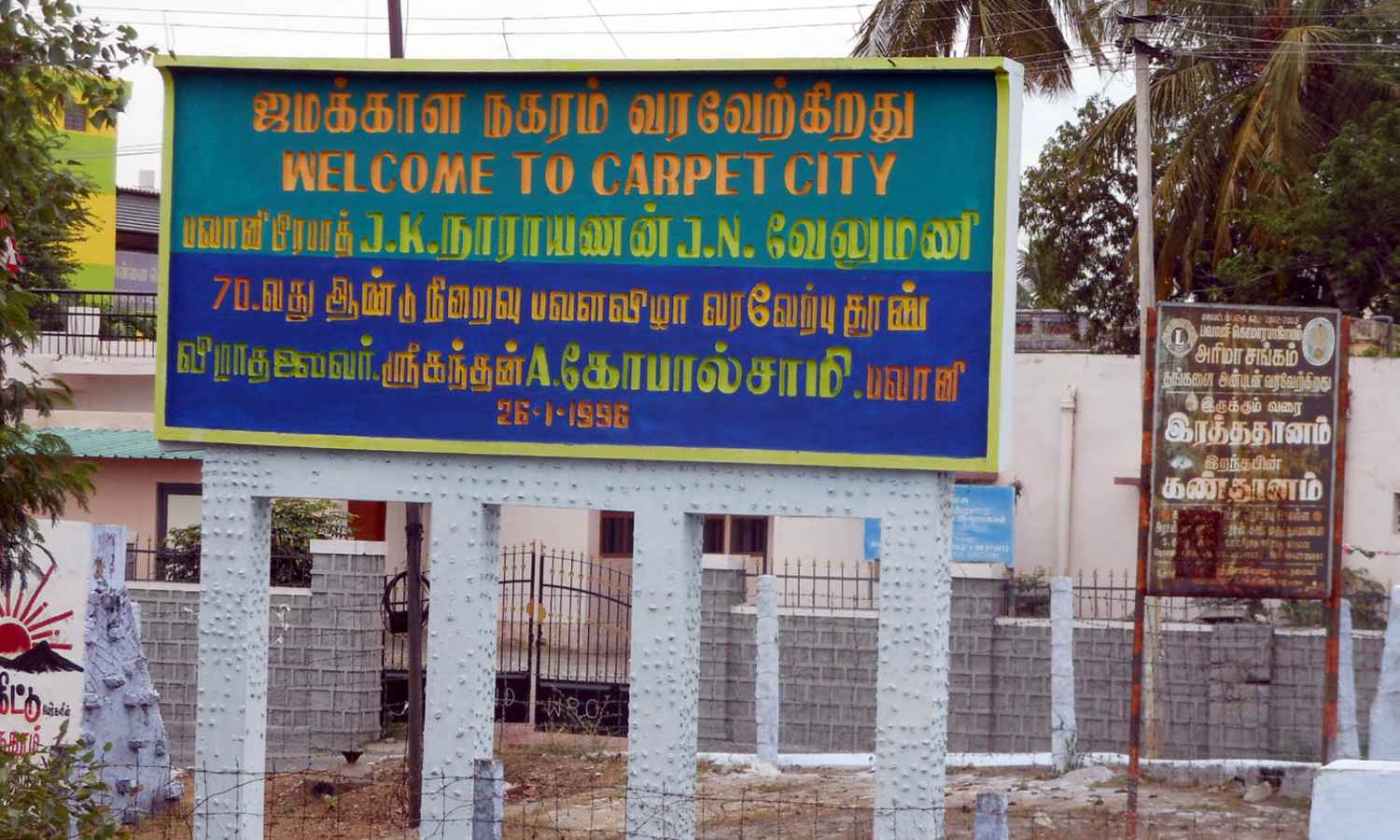Tamil Nadu: Traditional ‘jamakkalam’ weavers stare at uncertainty
As youth desist from following the footsteps of their family’s weaving tradition due to poor wages, the Bhavani Taluk, also called ‘Jamakkalam Nagaram’, is now left with a handful of elderly weavers
COIMBATORE: Sixty-nine-year-old Durai Raj is among the last generation of weavers struggling to keep the art of crafting silk border ‘jamakkalam’ alive.
“There may be just around 13 weavers in Bhavani Taluk who are still churning out these varieties of ‘jamakkalams’ known for their intricate designs woven with artificial silk. From more than 100 skilled workers until a decade ago, the number of our ilk has dwindled drastically in this vanishing craft,” said Durai Raj, a traditional weaver from Bhavani. He has been into weaving since the age of 15.
“Designs preferred by customers can be hand-woven in the ‘jamakkalams’, giving them a better look. In my yesteryears, I would weave complex designs and even human faces, but nowadays I have restricted myself to simple designs. Even my two sons and daughter have taken up other work due to poor wages in our traditional profession. It’s indeed a dying art,” he added.
Once a proud owner of four handlooms, Durai Raj had sold them long back and is working on daily wages at another handloom unit. Like him, many others are among the last generation of artisan weavers toiling beyond their retirement age, while upholding the tradition.
Workers at a dyeing unit
Nevertheless, the poor wages are driving the weavers to switch over to alternative professions. They say it’s difficult to make ends meet with such low wages amidst rising costs.
“Skilled silk weaving artisans get around Rs 400 per day as wages, unlike the regular ‘jamakkalam’ weavers, who get only around Rs 300 per day. Weaving a silk border ‘jamakkalam’ is time-consuming and laborious as compared to regular ones. Even though the demand is high for such blankets, poor wages are driving youngsters to other professions,” said another silk ‘jamakkalam’ weaver.
As youth desist from following in the footsteps of their family’s weaving tradition due to poor wages, the Bhavani Taluk, also called ‘Jamakkalam Nagaram’, is now left with a handful of elderly weavers.
“Particularly, the art of weaving silk border ‘jamakkalams’ could not be passed on to the next generation due to a lack of interest among the youth. Indeed, the state and central governments should intervene to safeguard our tradition,” said V Sidhaiyan, secretary of Bhavani Taluk Handloom Jamakkalam Blanket Weavers and Dyeing Workers Union (AITUC).
An official of the Handloom Department acknowledged that it’s a traditional art with demanding work, but doesn't fetch the revenue expected by weavers.
“It’s a traditional art and doesn’t fetch much revenue. That’s the reason why the number of those skilled weavers has dwindled drastically,” said an official of the handloom department.
Still, the demand for handloom ‘jamakkalams’ is high and peaks seasonally during major temple festivals like the Sabarimalai season.
“In and around Bhavani Taluk, there may be around 1,250 looms, and there are around 1,400 active weaver members in 24 co-operative societies. With the yarn provided by the co-operative societies, the weaver makes their produce, and it would be marketed by the society. All the societies are running in profit, and they make a monthly sale of up to Rs 2.5 crore. As already, a significant share towards the cost of a handloom product goes towards labour wages; the selling cost may rise further and could not be sold, if wages are increased further,” said an official of the handloom department.
Further, the official claimed that a weaver gets Rs 300 to Rs 350 per day, which is low compared to other industries. Recently, the government enhanced basic wages of weavers by ten per cent, and another ten per cent increase in daily allowance (DA). Two-thirds of weavers are women, who also work part-time in their household.
CARPET THREADS
· Two types of ‘jamakkalams’ are made in Bhavani; one from coarser cotton threads without designs, and another using artificial silk thread with different border designs
· Only a few people are engaged in the dying art of crafting border design ‘jamakkalams’
· A community of weavers called Jangamars weaved the ‘jamakkalams’ in pit looms
· Bhavani Jamakkalam was recognised with a GI tag in 2005
· Weavers want a ban on the local market being flooded by cheap variants from Solapur in Maharashtra
· Poor wages have pushed workers to switch to other jobs





